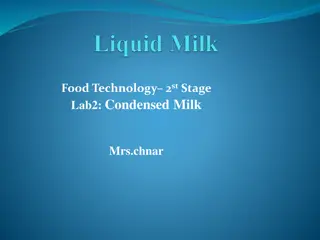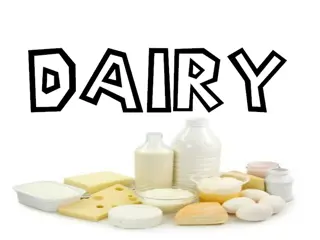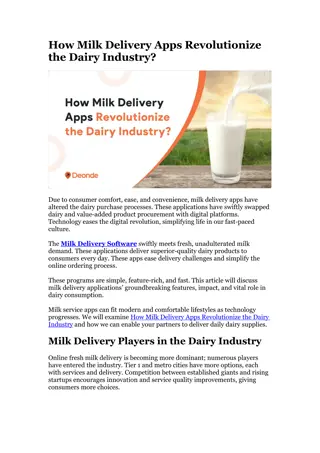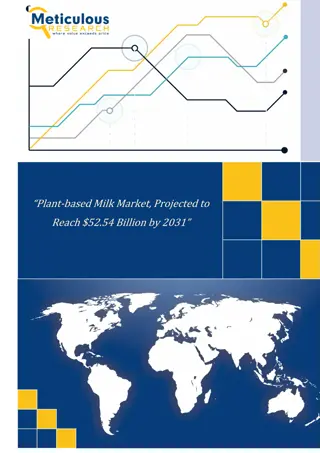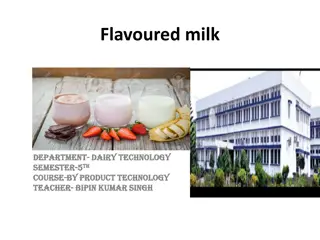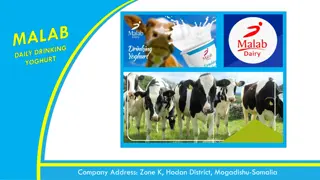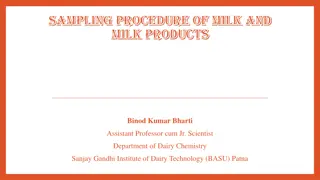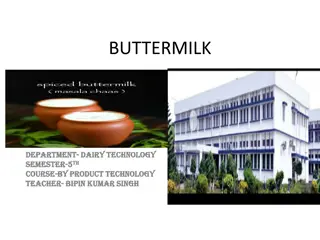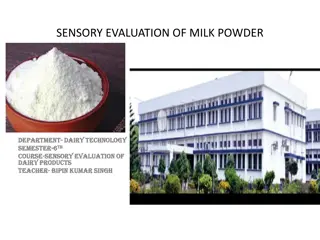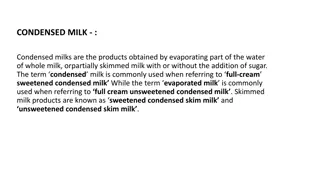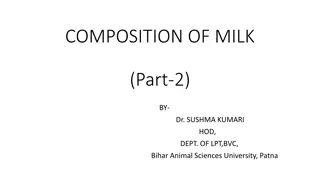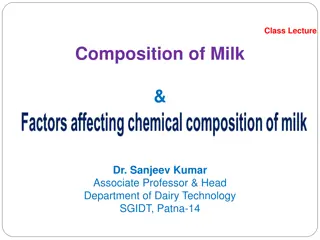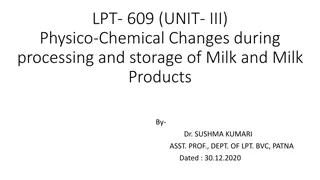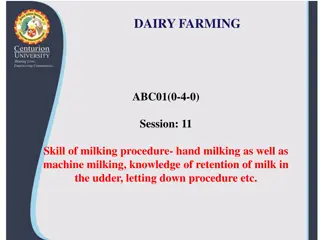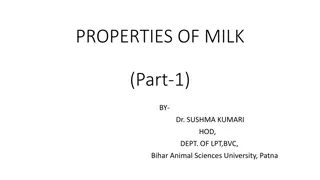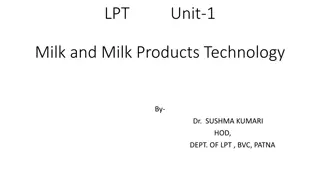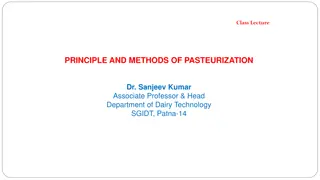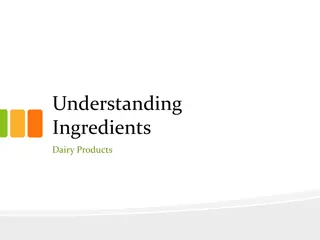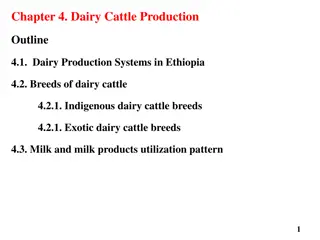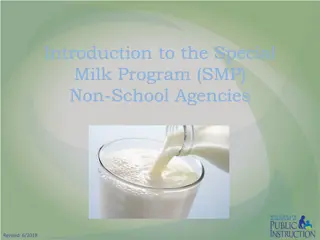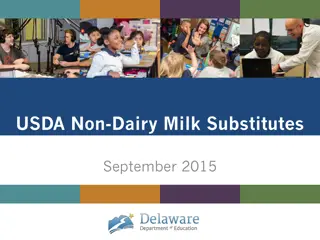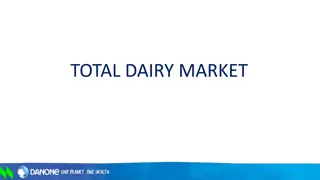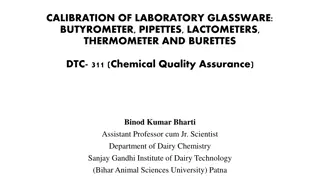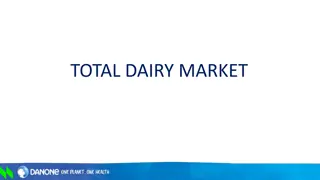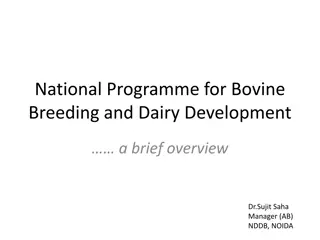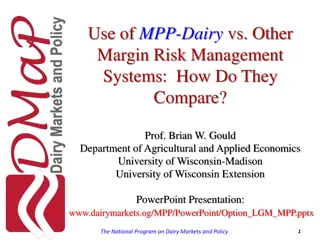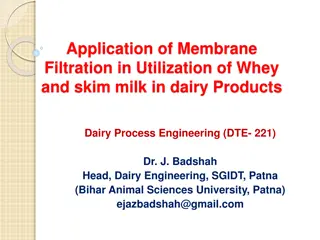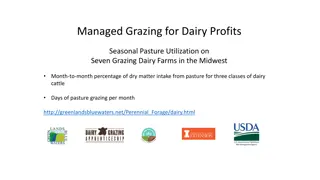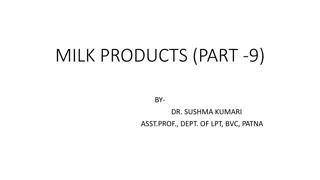Plant-based Milk Market: Application and Benefits
Meticulous Research\u00ae\u2014a leading global market research company, published a research report titled \u2018Plant-based Milk Market by Type (Almond Milk, Soy Milk, Coconut Milk, Oat Milk, Rice Milk), Formulation (Unflavored, Flavored), Distribution Channel (B2B, B2C [Modern Groceries, Convenie
1 views • 3 slides
Understanding Condensed Milk: A Comprehensive Overview
Condensed milk is cow's milk from which water has been removed, typically found with added sugar. There are two types: unsweetened and sweetened condensed milk. The product has a long shelf-life due to its high sugar content. It is used in various dessert dishes worldwide and can be a substitute for
3 views • 11 slides
Insights into Milk Composition and Processing
Worldwide, milk is collected from various animals such as cows, goats, sheep, yaks, and water buffalo. The composition of milk includes water, lactose, butterfat, protein, and minerals, each playing a vital role in its nutritional value. The butterfat content determines the richness of dairy product
7 views • 41 slides
How Milk Delivery Apps Revolutionize the Dairy Industry?
In this blog, we will examine How Milk Delivery Apps Revolutionize the Dairy Industry and how we can enable your partners to deliver daily dairy supplies. Milk delivery applications have improved the dairy business\u2019s convenience, quality, and sustainability.
2 views • 1 slides
Plant-based Milk Market, Projected to Reach $52.54 Billion by 2031
Plant-based Milk Market Size, Share, Forecast, & Trends Analysis by Type (Almond Milk, Soy Milk, Coconut Milk, Oat Milk, Rice Milk), Formulation (Flavored), Distribution Channel (B2B, B2C [Modern Groceries, Convenience Store]) - Global Forecast to 2031\n
0 views • 3 slides
Flavoured Milk: Delicious Varieties and Health Benefits
Flavoured milk is a popular dairy drink enjoyed by children and adults alike. It is made by adding flavorings and sugar to milk, resulting in delicious options like Chocolate, Marshmallow, Cherry, and more. Despite containing added sugar, flavoured milk retains the essential nutrients of plain milk
0 views • 11 slides
Sensory Evaluation and Grading of Milk in Dairy Technology
Judging and grading of milk in dairy technology involves sensory evaluation based on taste, smell, touch, and sound. Milk is classified into grades (Grade I, II, III) based on quality attributes such as off-flavors, colors, and foreign materials. Sensory evaluation utilizes all 5 senses to gather in
0 views • 13 slides
Milkada - Your Reliable Dairy Partner for High-Quality Dairy Products
Milkada, established in 2015, is a leading exporter of dairy products from Eastern Europe to Asian markets. Specializing in whey products, they also supply Mozzarella, Skim Milk Powder, UHT milk, and more to top companies. With a strong sales force and a diverse product range, Milkada continues to e
0 views • 9 slides
Malab Dairy Company - Leading Dairy Producer in Somalia
Malab Dairy Company, based in Mogadishu, Somalia, is a leading dairy producer in the region. Established in 2015, the company focuses on providing high-quality dairy products, including yogurt, using natural ingredients. With a commitment to customer satisfaction and quality, Malab Dairy aims to bec
1 views • 12 slides
Proper Sampling Procedure of Milk and Milk Products
Proper sampling of milk and milk products is crucial for accurate chemical analysis. This article covers the sampling procedures for various dairy products like milk, cream, paneer, ghee, and more. It emphasizes the importance of experienced personnel, sterile equipment for bacteriological testing,
1 views • 28 slides
Buttermilk: A Comprehensive Guide in Dairy Technology
Buttermilk is a crucial by-product in dairy technology, including various types like sweet cream, sour, and desi buttermilk. This guide covers its production, composition, differences from skim milk, and utilization in various dairy products. Explore how to make buttermilk, its properties, and benef
1 views • 11 slides
Sensory Evaluation of Milk Powder in Dairy Technology: Flavors and Characteristics
Sensory evaluation is crucial for determining the quality and shelf life of milk powder products. This study focuses on sensory analysis methods to identify flavors and physical characteristics of whole milk powder, skim milk powder, and malted milk. It discusses common flavor defects, texture varia
2 views • 12 slides
Understanding Condensed Milk: Types, Properties, and Manufacturing Process
Condensed milk is a dairy product made by evaporating water from whole or skimmed milk, with or without sugar. There are various types such as sweetened and unsweetened, each with specific requirements for milk fat content and sugar levels. The physico-chemical properties of condensed milk include f
2 views • 5 slides
Understanding the Composition and Nutritive Value of Milk
Milk composition varies due to factors like species, breed, feeding, and more. It contains essential nutrients like protein, minerals, and vitamins. Milk is a rich source of calcium, phosphorus, and vitamins, essential for overall health. The energy value of milk constituents varies, with milk fat h
0 views • 7 slides
Understanding the Composition of Milk by Dr. Sanjeev Kumar
Milk, a vital substance for mammalian offspring, is a complex fluid composed of water, fat, protein, lactose, minerals, vitamins, and enzymes. Dr. Sanjeev Kumar, an Associate Professor and Head of the Department of Dairy Technology at SGIDT, enlightens us on the various constituents of milk, market
0 views • 11 slides
How Does Dairy Management Software Help the Dairy Farm Industry?
If you\u2019re a dairy owner grappling with challenges like low profitability or inability to expand, this blog is for you. In this blog, we\u2019ll inspect how dairy management software is revolutionizing the dairy farm industry.
0 views • 1 slides
Physico-Chemical Changes in Milk and Milk Products During Processing and Storage
Physico-chemical changes occur in milk and milk products during processing and storage, including alterations such as salt precipitation, protein denaturation, and flavor changes. Heat treatments like autoclaving and freezing impact the composition, properties, and flavor of milk. Understanding thes
0 views • 9 slides
Understanding Milk Judging and Sensory Evaluation in Dairy Technology
In the dairy industry, milk judging involves assessing quality based on various attributes, while sensory evaluation encompasses the use of all five senses to gather information. Milk is graded into categories like Grade I, II, and III based on factors like off-flavors and foreign materials. Evaluat
0 views • 13 slides
Understanding Dairy Farming: Udder Anatomy and Milk Production
Exploring the external and internal anatomy of the udder in dairy cattle, including the functions of teats, streak canal, gland cistern, and supernumerary teats. Learn about milk retention, milking procedures, secretory tissue, and more crucial aspects of dairy farming.
1 views • 35 slides
Cream Separation Methods and Principles in Dairy Technology
Cream separation in dairy technology involves various methods such as centrifugal and gravity methods. The purpose is to obtain fat-reduced or fat-free milk, concentrate milk fat, standardize fat content, and recover fat. The separation is based on the principle that milk fat is lighter than skim mi
1 views • 12 slides
Understanding the Physico-Chemical Properties of Milk - Part 1 by Dr. Sushma Kumari
Physical and chemical properties of milk including its physical state, acidity levels, pH, density, freezing point, color, and flavor are discussed in detail in this informative article by Dr. Sushma Kumari from Bihar Animal Sciences University. Key points covered include the nature of milk constitu
0 views • 7 slides
Dairy Development in India: A Retrospective Analysis and Future Prospects
The milk industry in India has witnessed significant growth and development over the years, especially with initiatives like Operation Flood and the Anand Pattern Experiment at Amul. These programs have transformed India into the world's largest milk producer, emphasizing the importance of rural mil
0 views • 12 slides
Principles and Methods of Pasteurization in Dairy Technology
Pasteurization is a critical process in the dairy industry, named after Louis Pasteur. It involves heating milk to specific temperatures and durations to eliminate harmful microorganisms while preserving the product's quality. Important for ensuring milk safety, pasteurtization has limitations and v
1 views • 11 slides
Insights into New Zealand's Dairy Industry and Export Markets
Explore the dynamics of the New Zealand dairy industry through topics such as economic factors, export markets, and regional sales. Discover the challenges and benefits faced by dairy production in New Zealand, and delve into the strategies used by Fonterra, the leading dairy producer and exporter.
1 views • 19 slides
Exploring Dairy Products and Milk Varieties
The article delves into the realm of dairy products, focusing on various types such as milk, cheese, yogurt, cream, and butter. It explains how milk, produced by mammals like cows and sheep, serves as a vital source of nutrition for infants. Additionally, it details different heat treatments applied
3 views • 75 slides
Delamere Dairy - Leading the Way in Goat Milk Products
Delamere Dairy, founded by Roger and Liz Sutton, is a renowned business specializing in goat milk products. With a turnover of £20 million in 2015, they offer a range of dairy and dairy alternatives, including fresh goat's milk, cheese, butter, UHT milk, yogurt, and more. Their business model focus
1 views • 10 slides
Dairy Cattle Production Systems in Ethiopia: Overview and Practices
Ethiopia has a favorable environment for dairy development with diverse production systems including pastoralism, agro-pastoralism, and mixed farming. The country boasts indigenous and exotic dairy cattle breeds, supporting milk production and utilization. This article outlines the different dairy p
2 views • 38 slides
Understanding the Special Milk Program (SMP): Eligibility, Reimbursement, and Requirements
The Special Milk Program (SMP) encourages milk consumption among children in care settings, administered by the Department of Public Instruction (DPI) in Wisconsin. Participating agencies receive federal reimbursement for milk served to eligible children. This program operates year-round for non-sch
0 views • 34 slides
USDA Non-Dairy Milk Substitutes September 2015
Explore the USDA regulations and guidelines for non-dairy milk substitutes, focusing on cow's milk and soy milk. Learn about food allergies versus intolerances and the importance of approved substitutions. Understand the serving regulations for milk in CACFP meals and the accommodations required for
1 views • 11 slides
Dairy Market Insights in Kazakhstan: Consumption Trends and Dynamics
In 2021, milk and dairy consumption in Kazakhstan saw a decrease in per capita consumption, with varying rates in urban and rural areas. The highest consumption was in Eastern Kazakhstan region, while Shymkent had the lowest. The dairy market dynamics in March 2022 showed a slight decrease in volume
1 views • 9 slides
Dairy Laboratory Setup and Quality Control Guidelines
This article discusses the setup of testing facilities and analytical laboratories in the dairy industry, including the concept of mobile testing laboratories. It covers the types of dairy laboratories based on milk production, the importance of QC lab location in a dairy, layout and design consider
0 views • 28 slides
Ration Formulation and Feeding Practices for Dairy Cattle and Buffaloes
This informative article discusses the importance of colostrum feeding, milk feeding to calves, and milk feeding schedules for dairy cattle and buffaloes during various phases. It emphasizes the significance of timely colostrum intake for immunity development and the proper feeding of whole milk or
0 views • 20 slides
Margin Protection Program for Dairy Producers: Overview and Insights
This article discusses the Margin Protection Program for Dairy Producers, how it works, the key operating rules, and the implications for dairy farmers. It also highlights the role of the National Program on Dairy Markets and Policy in providing educational resources and research materials. Addition
0 views • 26 slides
Calibration of Laboratory Glassware for Milk Analysis
Laboratory glassware such as butyrometer, pipettes, lactometers, thermometers, and burettes play a crucial role in analyzing milk composition and quality. Proper calibration of these glassware items is essential to ensure accurate results, compliance with standards, and quality control in dairy labo
0 views • 22 slides
TOTAL DAIRY MARKET
In 2021, milk and dairy consumption in Kazakhstan saw a decline, with variations between urban and rural areas. The total dairy market dynamics for March 2022 show a slight decrease in volume but a growth in value. Segment-wise, both traditional and modern dairy markets experienced positive growth.
0 views • 9 slides
National Programme for Bovine Breeding and Dairy Development Overview
The National Programme for Bovine Breeding and Dairy Development (NPBBDD) is a Government of India funded project aimed at enhancing bovine breeding and dairy development in the country. It consists of two components: National Plan for Bovine Breeding (NPBB) and National Plan for Dairy Development (
0 views • 30 slides
Comparison of MPP-Dairy and Other Margin Risk Management Systems
MPP-Dairy enrollment does not impact using other risk management systems, with exceptions for Livestock Gross Margin for Dairy (LGM). You can still forward contract farm milk and purchase feed while using MPP-Dairy. Options-based strategies like Class III puts and feed-based calls can establish an I
0 views • 25 slides
Membrane Filtration in Dairy Products: Utilization of Whey and Skim Milk
Utilizing membrane filtration in dairy processing transforms whey, a byproduct of cheese production, into valuable products like refined proteins. Ultrafiltration (UF) allows for the fractionation of whey into protein-rich and lactose-containing streams, increasing protein content significantly. The
0 views • 11 slides
Comparison of Pasture Utilization in Midwest Dairy Farms
This study presents data on pasture utilization for dairy farming on seven Midwest dairy farms, showcasing the days of grazing and the percentage of dry matter intake from pasture for different classes of dairy cattle. The research conducted in 2018 by the Midwest Perennial Forage Working Group unde
0 views • 9 slides
Understanding Milk Products: Part 9 by Dr. Sushma Kumari
In this informative presentation by Dr. Sushma Kumari, Assistant Professor at Dept. of LPT, BVC, Patna, various milk products such as Khoa, Rabri, and Milk Powder are discussed in detail. The process of preparing Khoa, the different methods of making Milk Powder, including Roller Dried Whole Milk Po
0 views • 10 slides

